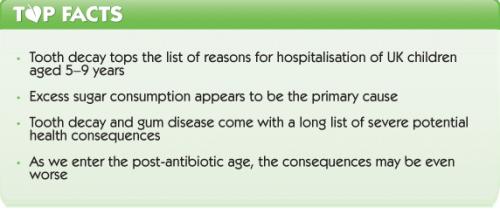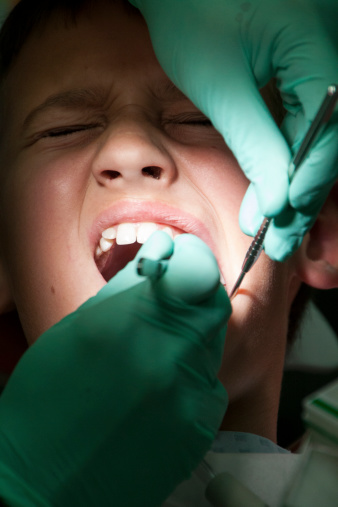UK primary school kids are being hospitalised for tooth decay at an incredible rate. But the consequences for these children don’t end there.
Rotten diets, rotten teeth
In 2013–14, there were 25,812 UK hospital admissions for children aged 5–9 years with severe tooth decay, up by 1019 (3.9%) from 24,793 in 2012–13. Tooth decay, or dental caries, is now the number 1 cause of hospitalisation for UK kids in this age group.
Looked at another way, it’s 496 times every week that primary school-age children in the world’s sixth-largest economy potentially needed multiple teeth removed, in hospital, under general anaesthetic.

Culprits and consequences
The essential reason behind the figures was pithily described by Graham Barnby of the British Dental Health Foundation (BDHF): “It all relates to the consumption of sugary, fizzy drinks”. The BDHF’s official response to the story went further, identifying the types of foods that make up children’s diets as a further problem, while thankfully only mentioning fluoride as a solution in passing.
The UK government’s National Diet and Nutrition Survey partly bears out this suspicion. Figures from 2008–12 reveal that children aged 4–10 years ate a mean of 59.1–69.0 g of added sugar per day, equivalent to 14.0–16.1% of total food energy. That’s around 14 teaspoons of sugar every day! Although teenagers ate even more sugar, it’s an enormous amount for children whose teeth, and bodies, are still developing – and much of it undoubtedly comes from fizzy drinks and supermarket fruit juices, the latter considered a healthy option by many parents.
Tragically, the health consequences for UK kids of rampant sugar consumption go way beyond rotten teeth. Convincing evidence links tooth decay with serious chronic diseases, from cardiovascular disease, diabetes and respiratory disease to stroke, kidney disease, dementia and many more.
The (antibiotic) drugs don’t work
Unfortunately, humanity’s arrogant assumption that it can defeat bacteria using drugs may be on the verge of catapulting tooth decay itself to the status of health emergency. Dental caries develops when a bacterial film, known as a plaque, builds up on teeth and remains untreated. Left long enough, the consequences include gingivitis and periodontal disease, which can be treated by standard dental techniques and root planing in more severe cases. Dental procedures like root planing and root canal work often involve powerful antibiotics to eliminate the bacteria that are the source of an infection. But antibiotics, even if effective, can struggle to reach the anaerobic (non-oxygen dependent) bacteria that reside deep in the root canals or even the bone of the jaw as a result of tooth decay/gum disease.
However, as the UK Independent reports, “In an unprecedented move, all seven UK research councils...and the country’s biggest research charity, the Wellcome Trust, will join forces to tackle the problem of antimicrobial resistance.” The Independent portrays an atmosphere of near-panic among the UK’s scientific élite after the discovery in a river of a strain of human gut bacteria with resistance to a broad-spectrum antibiotic. As World Health Organization boss Margaret Chan’s dire warnings of the ‘end of modern medicine’ hit home and the final pillars of humanity’s medical defense against microbial pathogens crumble, we approach an age where conditions like gum disease go from tricky to life-threatening.
New toys please!
Looking again at Ms Chan’s pronouncements, it’s easy to see where the assembled big guns of UK science will turn for their solutions to the antibiotic resistance conundrum: technology, especially vaccines and new antibiotic agents. The obvious question that follows is, why should more of the same lead to a different outcome this time? Indiscriminate use of antibiotic agents has led directly to a situation where bacteria have become resistant to those agents – exactly as the science told us they would. Bacteria have amply demonstrated their supreme ability to mutate rapidly and consistently to ensure their survival. Quite simply, we can’t keep up.
Natural solutions
Therefore, the answers, as ever, lie in Nature. At one level, simply reverting to a more evolutionarily appropriate diet – in short, one less reliant on added sugars, simple carbohydrates and processed foods – would sort out the UK tooth decay epidemic in a trice. Evidence exists to show that people eating traditional, nutrient-rich diets don’t develop tooth decay – even without brushing their teeth! Our 2006 report, ironically originally written for the WHO, gives an inkling of the vast array of natural strategies for boosting our immune systems – and it was written before much of the evidence on vitamin D emerged. As for the problem of antibiotic resistance, surely the best thing to do would be to shift our focus from a relentless war on bacteria, one that we are never going to win, toward ways of thriving in a world of which bacteria are an inescapable part?








Comments
your voice counts
23 July 2014 at 9:37 pm
Since all carbs are sugar and yes even the holy grail, whole grains, they are all bad. Not even the other 19 reason not to eat carbs need to be mentioned when it comes to sugar. Sugar is insidious, destroying the teeth, stomach, friendly bacterial, feeding the fungus and unfriendly bacterial, creating glycation that rots us from the inside out and ages us faster.
For every study showing it is safe to consume these foods there are 100 showing the opposite.
Robert Redfern
22 August 2014 at 8:47 pm
Personally, I believe that if parents simply pay more attention to their children and what their children are eating as early as possible, at lot of dental problems in kids can be avoided. Start them young, as they say, because that is when good (and bad) eating habits are picked up.
14 October 2014 at 7:35 am
As a dentist I have seen this first hand. Decay in children is rampant. I have witnessed children as little as 1 year old with "soda pop" in their sippy cups, and a mouth full of rotten teeth. Some parents put juice in the sippy thinking it is a healthier alternative. It isn't. Citrus flavored drinks are the worst. Even milk has carbohydrates in it and can cause tooth decay. Never put a baby to bed with a bottle full of milk. Water and only water. Also, until that child is 8, he/she needs you to brush their teeth for them. They just don't have the manual dexterity and the understanding to do it themselves. Get some spit on your fingers, and prevent that kid from needing dental treatment.
Brad N Strong DDS
Your voice counts
We welcome your comments and are very interested in your point of view, but we ask that you keep them relevant to the article, that they be civil and without commercial links. All comments are moderated prior to being published. We reserve the right to edit or not publish comments that we consider abusive or offensive.
There is extra content here from a third party provider. You will be unable to see this content unless you agree to allow Content Cookies. Cookie Preferences